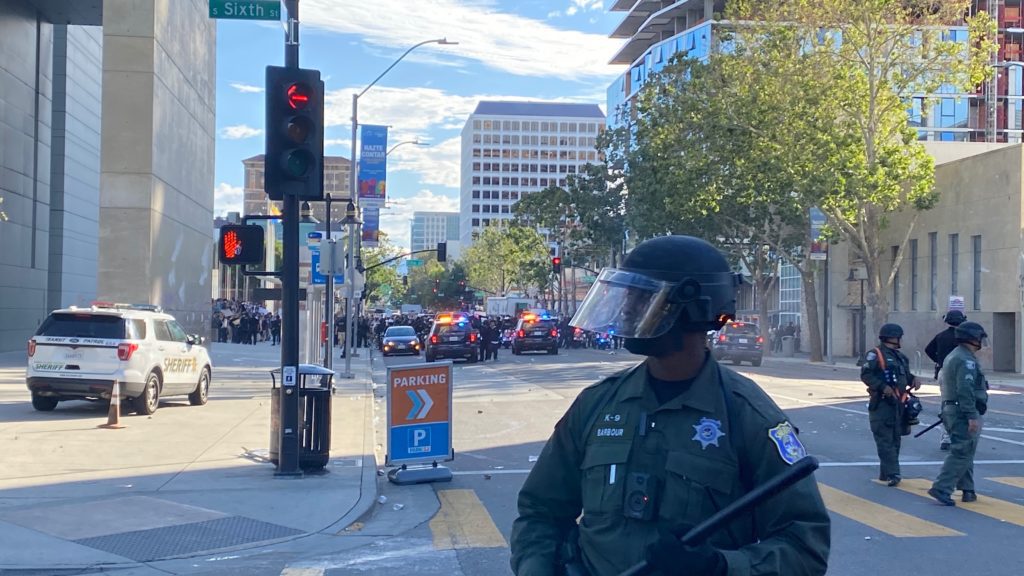A San Jose commission responsible for tweaking city rules suggests studying a policy that allows nonprofits first dibs on buying housing properties, as well as creating commissions on police reform and climate change.
The San Jose Charter Review Commission Thursday voted to recommend a series of police and climate change reforms. It recommended establishing a permanent police oversight commission, a climate change commission and a policy that would allow nonprofits to purchase apartment complexes before developers or landlords.
The 23-member commission suggests changes to the city charter, which is the city’s constitution. The recommendations will head to the City Council and require voter approval. The commission last month voted in favor of shifting the election of mayor from midterm election years to presidential election years to increase voter turnout and expand the number of council districts from 10 to 14.
It also recommended allowing the City Council to appoint a city manager—instead of just the mayor.
“I hope the City Council and the mayor will really listen to what the people of San Jose say they want changed in the city, including police oversight, climate mitigation and affordable housing,” Commissioner Magnolia Segol told San José Spotlight shortly after Thursday’s meeting.
A new policy for nonprofits
The commission voted to have the city study the Community Opportunity to Purchase Act (COPA) in a 16-5 vote, with Commissioner Thi Tran absent. Commissioners Lan Diep, Tobin Gilman, Barbara Marshman, Elizabeth Monley and Yong Zhao voted no.
The commission suggested San Jose immediately study COPA to determine which properties and nonprofits would be eligible for the program. Enacting the policy is one of the city’s strategies in an anti-displacement plan.
COPA allows qualified nonprofits the first right to purchase certain properties put on the market which could prevent displacement of tenants. If another buyer makes an offer, nonprofits under COPA will have the right to match the offer. Different cities across the nation, including San Francisco and Washington, D.C., have already established their own COPA-related programs.
“The housing crisis is getting worse ever since I moved here with my family in 1990, but what’s alarming now is that it’s getting worse faster and faster and faster,” said Sandy Perry of the South Bay Community Land Trust during public comment. “COPA isn’t the end solution, but an important part of a paradigm shift to treating housing as a human right.”
San Jose spokesperson Jeff Scott said the city is researching the possibility of a COPA program. He said city employees have held 16 meetings since April with two advisory committees to discuss what a local program might look like. The city plans to hold a series of community meetings in December and January, but the soonest a COPA ordinance would go before the City Council for consideration is spring. Scott said the decision doesn’t need to go to voters for approval.

Police commission
The Charter Review Commission voted to recommend the formation of a police commission in a 20-1-1 vote. Commissioner Frank Maitski voted no and Gilman was not present. The commission aims to give residents more oversight over the city’s police department. Residents and activists have called for more reform in the wake of the murder of George Floyd.
The commission recommends the city form an inspector general’s office, which would oversee the San Jose Police Department and evaluate practices such as training officers and budgeting proposals. The commission also recommends converting the office of the Independent Police Auditor to the Independent Investigations Department. The body would have the ability to issue subpoenas and have access to all police documents.
“I think this is important because our community is very behind on this matter,” said resident Sandra Asher. “I know there have been various questions and feedback. I would encourage you not to let perfect be the enemy of good.”
The Charter Review Commission has taken an active role in discussing police reform. It previously discussed a proposal that sought to ensure racial and ethnic minorities are not disproportionately harmed by proposed laws. That’s despite calls for the commission to narrow its focus away from policing from the city manager.
In an attempt to address police violence, the city in June resurrected a police reform board made up of community activists. A recent report from the Independent Police Auditor however shows that one in four SJPD officers received complaints of misconduct.
The commission will hold its final meeting on Nov. 29. Recommendations from the Charter Review Commission will come to the City Council at a later date.
Climate change commission
On the topic of climate change, the commission recommended the city create a climate action commission, an 11-member body that would advise the City Council on climate issues.
The commission will aim to track and measure greenhouse gas emissions data and ask for policies that will bring the city closer to its 2030 carbon neutral goal.
The City Council earlier this month unanimously set a goal to achieve carbon neutrality by 2030. It will have to do so by encouraging residents to use electric cars and encouraging developers to use alternative energy, such as solar.
The Charter Review Commission recommended the climate change commission should go directly to the council to consider and create. That allows the city to bypass voter approval because the commission believed the issue of climate change was “dire” enough.
“What an incredible amount of work that has gone into these very thoughtful, well-discussed, well-heard recommendations and policy changes,” said Commission Chair Fred Ferrer.
Contact Lloyd Alaban at [email protected] or follow @lloydalaban on Twitter.



Leave a Reply
You must be logged in to post a comment.